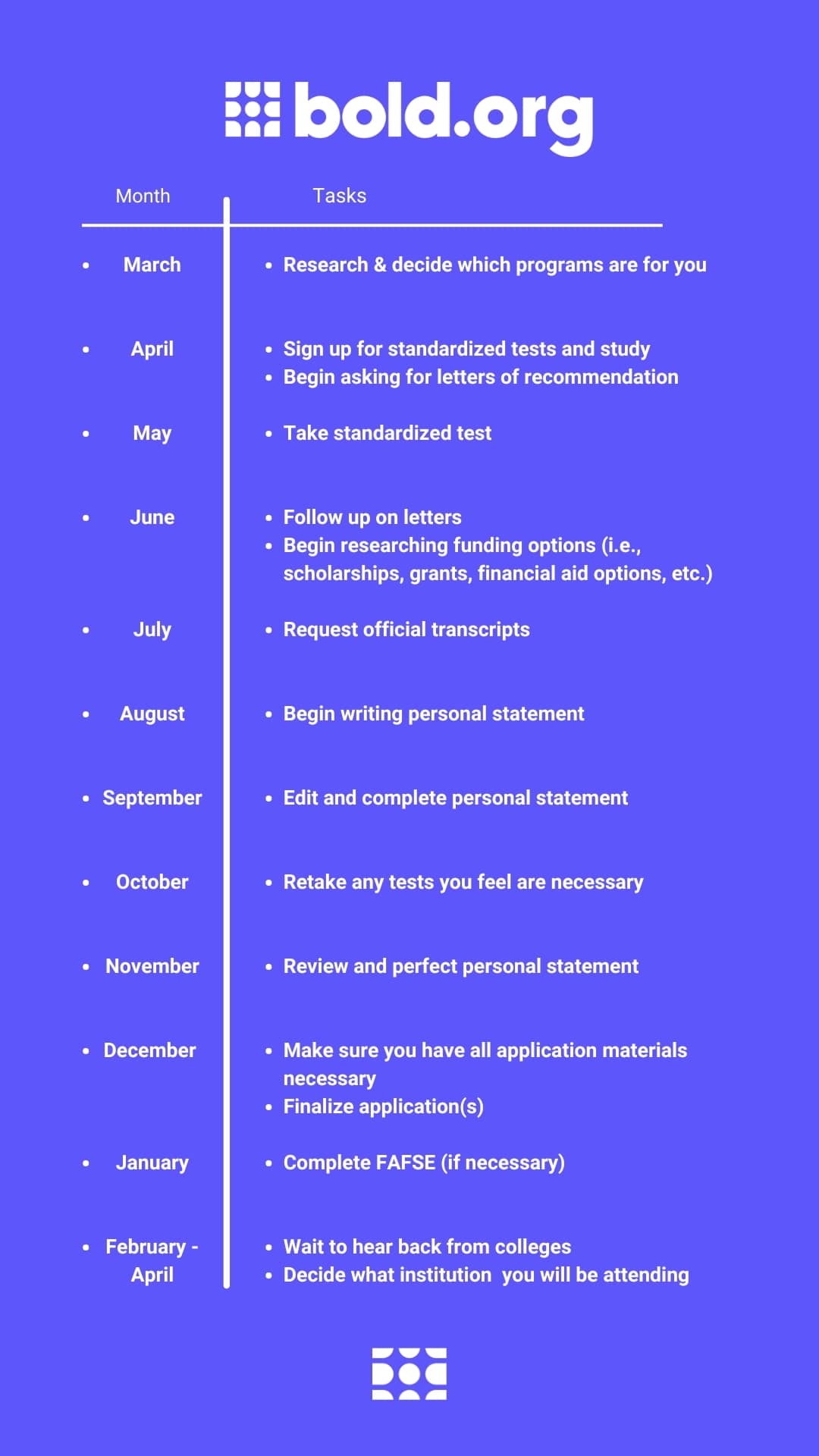When to Apply for Grad School


When I was an undergrad, I told myself I would apply for graduate school and pursue my masters once I got my bachelor's degree. I had it all figured out, but when it came down to it, I missed deadlines and didn't know how to request official transcripts or what to include in my statement of purpose for my intended master's program. Overall, I wasn't prepared for the extensive application process.
If you're finding yourself in the same predicament, I'm here to assure you it's okay! However, if I could offer one piece of advice, it would be this: start with knowing when to apply for grad school.
Today, I will be talking about when to apply for grad school, understanding the application process, and how to prepare your grad application. I know, I know—it sounds tedious and time-consuming, and I won't lie, it is. But with the right guide and knowledge of what you can expect, you'll be confident and ready and on your way to receiving your graduate degree.
Ready to head to grad school? Head over to Bold.org and discover how you can apply for exclusive scholarships that will help carry the financial load!
Get Matched to Thousands of Scholarships
Create your Bold.org profile to access thousands of exclusive scholarships, available only on Bold.org.
Create Free ProfileUnderstanding the Graduate School Application Process
Preparing to apply for college is, for lack of better words, a big deal. Especially if you're continuing your education. It takes time and effort to research programs, prioritize steps, and even learn how to use logical and verbal reasoning in your personal statement. It can definitely be a challenge.
Applying to college as an undergraduate or graduate student heavily depends on what you want to study. If you're still unsure about your fields of interest, check out our guide on how to choose a career.
However, if you're a college student, you know what the college application process looks like. The deadlines, academic requirements, accolades needed to leave an impression, etc. However, when it comes to the graduate school application, things are a little different. Though they essentially meet the same expectations as an undergraduate college application, they differ in terms of what (now) matters. Let me explain.
Grad school isn't cheap either—apply for these exclusive graduate school scholarships today!
What is the Grad School Application Process?
As a preface, the graduate school application process will vary depending on the graduate school programs you are interested in, but as stated, it's similar to any other college application. Here is what you can expect in the grad school application process:
- Application form: Colleges and universities use an online application portal where prospective students will fill out personal details, academic history, and program-specific questions. It will also include questions related to your personal background, reasons for applying, and how you plan to contribute to the academic community.
- Standardized Tests: Some programs require standardized test scores, such as the Graduate Record Examinations (GRE), Graduate Management Admissions Test (GMAT), or Law School Admissions Test (LSAT). It's important to understand which tests are required for what program and register for them in advance. You will want to request official scores to be sent to your chosen institutions by the testing agency. Keep in mind that scores may take a few weeks to be processed.
- Transcripts: Request official transcripts from all institutions you’ve attended (undergraduate and any post-graduate education) as soon as you're able. Some programs may require sealed hard copies, while others accept electronic submissions. Do your due diligence and know which form of submission is required for your chosen graduate schools.
- Letters of Recommendation: These letters should speak to your academic abilities, professional and academic interests, and potential for graduate study, which is why they should be requested from people who can attest to your potential (i.e., professors, mentors, colleagues, etc.). Give your recommenders at least 4–6 weeks to work on their recommendations.
- Personal Statement: Write a clear and focused personal statement/statement of purpose that explains why you want to pursue this particular program, what your academic and professional goals are, and why you’re a good fit for the program.
- Resume/CV: Update your resume or CV to include academic achievements, relevant work or research experience, internships, leadership roles, and any relevant skills (i.e., technical skills, languages, certifications).
- Writing Sample/Portfolio: Many programs, especially in the humanities or social sciences, may ask for writing samples that demonstrate your research, analytical thinking, and writing abilities. For programs in fields like architecture, fine arts, or design, you may need to submit a portfolio of your work to demonstrate your artistic skills.
As you can see, the application process mimics that of an undergrad application but is more rounded and composed. If you're worried, don't be. With the proper time management, applying to grad school will be easy!
Create Your Free Profile to Apply for Scholarships Today!Why Timing is Important
Most graduate schools will require you to submit your application between October and February. The exact date will vary from school to school, so make sure you check when exactly the deadline is for each college you're applying to.
Giving yourself the right amount of time to prepare your application for grad school programs is crucial in the process for one very simple reason: you will need it. Deadlines vary from program to program, but they will creep up on you and may leave you in a crunch time you don't need to be in. This is why it's key to start preparing your application sooner rather than later.
Submitting grad school applications early can increase your chances of acceptance and funding. A well-planned application timeline can help you meet deadlines and reduce stress, as well as give you a clearer idea of how you want your academic and career aspirations to unfold throughout your academic career.

How Early Should You Apply to Grad School?
Knowing when to start applying to graduate school is key. So, to put it as bluntly as possible, start now. Or as soon as you know what you're going to study. Many graduate programs are rigorous and time-demanding. If you want to attend graduate school, it's beneficial for you to develop good time management habits. What better way to start than with the application process?
Here are a few things you can accomplish by applying to grad school early:
Assess Graduate Programs
Applying early allows time to research and select graduate programs that align with your future goals and aspirations. You will be able to evaluate factors like program reputation, curriculum, location, etc., as well as where you see yourself long-term. I suggest creating a list of the graduate programs you are eyeing and their deadlines. This will keep you on track to the finish line.
Review Financial Considerations
Because graduate school is pricey, you must assess your personal and financial readiness for graduate school. This is where you need to be realistic. Considering factors like career goals, financial stability, and explore funding options, such as graduate school scholarships..
Also, evaluate your motivation for attending graduate school, as well as how a demanding academic schedule will affect your work, family, and professional responsibilities to ensure a successful graduate school experience. Without truly taking these factors into account, you might be biting more than you can chew, and I only want to steer you to a path of success.
For more ways to fund your academic journey, browse through hundreds of Bold.org's exclusive scholarships and start applying today.
Interview Preparation
Some colleges and universities hold interviews as a part of the application process. This is to evaluate how the student fits into the graduate program. Research your programs of choice and its faculty to develop thoughtful questions, prepare mock interviews with friends and/or family, and even ask advisors for guidance. But I will stress that you practice your responses in whichever way you can.
Finalizing Applications
Preparing the application process ahead of time will allow you even more time to finalize and submit your applications. This means ensuring you meet the deadlines, reviewing your application details, and ensuring you have gathered all required documents necessary. That way, when you've crossed all Ts and dotted all Is, you can submit your applications stress-free.
The Grad School Application Timeline
Now that we've gone over the essentials, let me break down the (ideal) grad school application timeline for you:

Though the chart gives you an ideal timeline for breaking down the submission process, it's important to know you can adjust it as you see fit. However, don't adjust too much, or you might fall off track!
Good luck!

Frequently Asked Questions About When to Apply to Graduate School
Should I attend grad school immediately after undergrad?
While this is dependent on your personal goals, ideally, you'd want to consider whether attending graduate school immediately after undergrad is right for you. Evaluate factors like career goals, financial stability, and personal readiness. If all aligns with your aspirations, develop a plan to achieve your goals, whether that includes attending graduate school immediately or taking time off.
Do graduate school applications require test scores?
Some programs require standardized test scores, such as the Graduate Record Examinations (GRE), Graduate Management Admissions Test (GMAT), or Law School Admissions Test (LSAT). So, if you're a pre-med student, you'll more than likely need to submit a medical college admissions test during the process. It's important to understand which tests are required for what program and register for them in advance.
When should I start applying for grad school?
To put it plainly: NOW. The earlier you start applying to grad school, the more time you'll have to gather and complete everything needed, the sooner you can submit your applications. Though it can be time-consuming, it doesn't have to be stressful. I suggest you develop a graduate school application timeline to stay organized and on track. See our chart above for a detailed structure of what your timeline can look like.
Visit our Scholarship Blog for more information on how to fund your graduate school journey and more.

About Chanelle
Chanelle is a dedicated and seasoned writer, editor, and researcher. She’s familiar with college admissions, finding and applying for scholarships, and the financial aid process.
She graduated from the University of South Florida with a major in English, Creative Writing with a specialization in Technical Writing.
Experience
Chanelle has over a decade of experience in the writing industry, specializing in blog writing, SEO writing, editing, translations, corporate writing, and various forms of creative writing. She founded and operated Femme Feature Magazine, an online and print publication dedicated to celebrating women in all corners of the creative field. An avid reader, Chanelle is constantly seeking refined and innovative ways to tell her stories. Writing is her foremost passion, and she is always on the lookout for her next narrative adventure.
Since joining the Bold.org team in 2023, Chanelle has brought her enthusiasm for merging the writing and digital worlds. She is dedicated to assisting students and young adults in navigating their educational and professional journeys.
Chanelle's unwavering commitment to her craft and her dedication to helping others shine through in her work. Leveraging her personal and professional experiences, she provides invaluable support to students, empowering them to achieve their goals and realize their potential.
Quote from Chanelle
“There is always a way to say the same thing over and over again. You just have to be creative and think outside the box.”